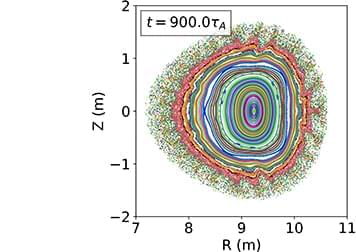We use the new simulation capabilities of the extended-magnetohydrodynamic (MHD) code, M3D-C1, to investigate the nonlinear MHD properties of a reactor-scale quasisymmetric stellarator equilibrium. Our model captures the self-consistent evolution of the magnetic field, temperature, density, and flow profiles without imposing restrictions on the structure of the first. We include the effects of resistivity using a realistic temperature-dependent Spitzer model, along with a model for heat transport that captures the key physical characteristic, namely, strongly anisotropic diffusion in directions perpendicular and parallel to the magnetic field. We consider a quasi-axisymmetric, finite-pressure equilibrium that was optimized for self-consistent bootstrap current, quasi-symmetry, and energetic particle confinement. Our assessment finds that the equilibrium is highly unstable to interchange-like pressure-driven instabilities near the plasma edge. The initially unstable modes rapidly destabilize other modes in the direction of the N-fold rotational symmetry (toroidal, in this case). For this equilibrium, N = 2, meaning destabilization of a large number of even-numbered toroidal Fourier modes. Thus, field-periodicity is likely to be an important factor in the nonlinear MHD stability characteristics of optimized stellarators.
